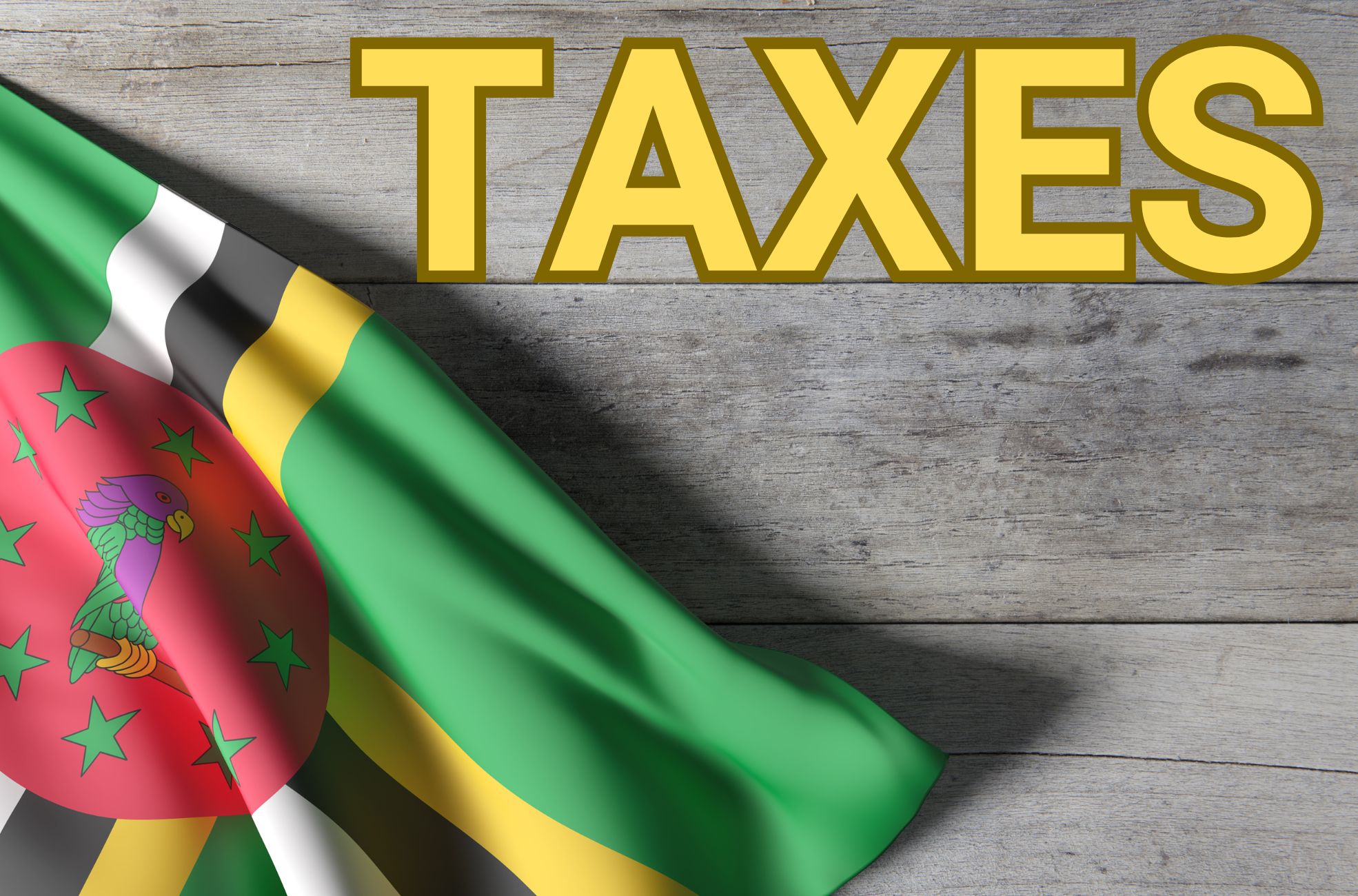Navigating the landscape of Dominica taxes can be a crucial factor for individuals and businesses considering the island nation as a destination for investment and residency. In 2024, understanding the various tax types, residency implications, and recent changes in legislation becomes imperative to make informed decisions.
Whether you’re an expatriate exploring citizenship through investment or a business eyeing expansion opportunities, getting acquainted with the ins and outs of Dominica’s tax system, including income tax rates, deductions, VAT, and international tax treaties, is essential. We’re here to equip you with the relevant aspects of Dominica’s tax regime to ensure compliance and optimize your financial planning.
Dominica’s Tax System
Types of Taxes in Dominica
Dominica’s tax system is tailored to be attractive to both individuals and businesses, offering a variety of taxes based on your residency status and income sources. If you’re an expatriate considering citizenship by investment, you’ll want to familiarize yourself with your tax information and the different types of taxes you might face. Non-residents are taxed only on income that originates within Dominica, like rental income from property on the island.
Meanwhile, Dominica tax residents are subject to income tax on their worldwide income, which includes earnings from employment, self-employment, dividends, and rental income. It’s important to note that getting a Dominican passport doesn’t automatically make you a tax resident. To be considered a tax resident, you need to live in Dominica for at least 183 days a year.
Income tax rates in Dominica are progressive, ranging from 15% to 35%. Dividends paid by companies face withholding tax, but if you’re receiving dividends, you won’t be taxed on them. Also, resident in Dominica, income from the sale of real estate isn’t subject to income or capital gains tax. Tax deductions are up for grabs, with tax residents eligible for a standard deduction of $11,100. Non-residents face a 15% withholding tax on certain types of income, such as dividends and rental yields.
Taxation Authority and Governance
The local tax authority in Dominica is in charge of managing taxation governance. This includes making sure tax laws are followed and collecting taxes. Taxes are collected monthly, and income tax payments are due monthly by the 15th.
Tax residents with a salary income that is at most $11,100 per year must file an annual income tax return by March 31st. If you’re an expatriate aiming to become a tax resident, you’ll need to register at your place of residence in Dominica, obtain a Dominican Tax resident ID and Tax Code, and meet the residency requirement.
Legal Framework for Taxation
Dominica’s legal framework for taxation is set up to avoid double taxation, which is particularly beneficial for those who might be taxed in more than one jurisdiction. The country has double taxation agreements with CARICOM members, which can help lighten the tax load if you have tax obligations in multiple countries.
The framework also details how Dominica tax resident companies are taxed, with resident companies paying a 25% corporate income tax and contributing 7% to social funds based on employee salaries. Non-resident companies are taxed only on their profits sourced in Dominica.
Recent Changes in Tax Legislation
Tax legislation in Dominica can change, impacting expatriates and investors. The 2022-2023 budget introduced several tax-related measures, such as scrapping duties and taxes on imported pleasure crafts and their engines. VAT on agricultural tools and potting soil has been removed as well.
Moreover, fees associated with land transfers have been lowered. New rates have been established for stamp duty to pay property tax, judicial fees, and assurance funds. A tax on abandoned properties has been introduced, too, charged at a rate of $0.50 per square foot per year.
If you’re interested in the citizenship by investment program, it’s important to be aware of the financial commitments beyond the initial investment, including due diligence, processing, and passport fees. The program offers citizenship through a contribution to the Economic Diversification Fund or a real estate purchase from a government-approved list. The investment amount required will depend on the size of your family.

Personal Income Tax in Dominica
Who Is Liable for Personal Income Tax?
Understanding the implications of their property tax liabilities is crucial for expatriates aiming for citizenship through investment. Once surpassing the 183-day presence within a tax year, they are considered residents for tax purposes.
Those with a sole income from employment below the threshold are not required to file a return. However, for individuals with various sources of income, it’s necessary to pay taxes and consolidate all earnings to determine tax liability after allowable deductions.
Tax Rates and Brackets
The progressive nature of the tax system ensures equitable contributions. For incomes between $30,001 and $50,000, the rate is 15%. Incomes between $50,001 and $80,000 are taxed at 25%, and any income exceeding $80,000 is subject to a 35% rate.
Deductions and Allowances
Taxpayers can take advantage of several deductions and allowances to lower their taxable income. The Resident Allowance is subtracted from gross income to determine the taxable amount. Additional deductions include mortgage interest relief for homeowners, capped at $25,000, and deductions for charitable contributions and student loan interest, with a limit of $5,000 per student. These incentives are designed to encourage investment in housing, education, and philanthropy.
Tax Filing Process for Individuals
Residents must submit their tax returns to the Inland Revenue Division by the end of March. Self-employed individuals and family members are required to declare all income sources.
Penalties are in place to enforce compliance, including a 5% charge for late filing based on the tax due. Delinquent payments incur a 10% penalty and 1% monthly interest on the outstanding balance. Severe non-compliance, such as tax evasion, may lead to legal action.
Disagreements with tax assessments can be addressed through an objection process, with the option to appeal to the Appeal Commissioners or the Courts, ensuring taxpayers have recourse to challenge decisions.

Corporate Tax Obligations
Corporate Income Tax Structure
Businesses in Dominica must adhere to a corporate income tax rate of 25% on their net profits. These payments are due quarterly throughout the fiscal year at varying rates. To ensure compliance, companies are required to submit their tax returns, including financial statements, within three months following the end of their financial year.
Special Tax Regimes for Businesses
The special tax regime for international business companies, which was in effect until the end of 2021, is no longer available. Currently, businesses must adhere to the prevailing tax framework, which encompasses the corporate and personal income tax rates and other relevant taxes.
While there is no capital gains tax, businesses should be aware of the standard VAT of 15%, with a reduced rate for hotel services and diving. Certain goods are taxable at a zero rate.
Tax Incentives for Investors
The government provides incentives to foster both domestic and foreign private investment. These incentives include the repatriation of profits and dividends and the importation of capital without restrictions. The legal system, rooted in British common law, allows for full foreign ownership without discrimination. Tax holidays, duty-free import of equipment and materials, and exemptions from VAT on select capital investments are among the benefits offered. There are exemptions from withholding tax on dividends, interest, and certain external payments.
The IDA endorses citizenship through investment projects, which can be appealing for expatriates seeking citizenship through investment.
Compliance and Reporting Requirements
Businesses must register with CIPO, the Tax Authority, and the Social Services Institute. CIPO’s e-filing portal facilitates company registration and other services. Employers and employees are required to contribute to social security at rates of 7% and 6%, respectively, for remuneration up to $2,220 per month. Stamp duty applies to real estate transactions, with rates varying based on the transaction’s nature and property value.
Other fees, including insurance premiums and legal fees, may apply to these transactions. Dominica’s adherence to international standards is reflected in its participation in DTCs and TIEAs with various jurisdictions, offering a degree of predictability and security for investors. The government’s focus on renewable energy sector incentives and the absence of foreign trade zones or free ports underscore the specific nature of investment opportunities. Dominica complies with the TRIMs Agreement as a WTO member, ensuring its investment policies align with international standards.
VAT and Other Consumption Taxes
Understanding VAT in Dominica
The VAT was implemented to simplify the taxation landscape by replacing a variety of older levies with a single, more manageable system.
Calculation and Rates of VAT
For most products and activities, a 15% VAT is applicable. However, certain services, such as hotel accommodations and diving, are subject to a reduced 10% rate.
Exempt Goods and Services
A range of items and services are zero-rated, meaning they are not subject to VAT. These include basic necessities and certain utilities, which contribute to a more affordable cost of living for residents and expatriates alike.
Filing and Remitting VAT
Entities with annual taxable supplies exceeding $250,000 are obligated to register for VAT and display their registration on their business premises. They must collect VAT and remit it to the Comptroller by the 20th of the month following the transaction. Failure to pay taxes or to file a VAT return incurs a monthly fee of $100 until the return is filed. A 10% penalty is also applied to late payments, with interest accruing at 1% per month.
Businesses must issue a tax invoice for every transaction to VAT-registered customers and provide a receipt to those who are not registered. Event promoters must seek approval from the Comptroller for public entertainment, with non-compliance resulting in significant fines.

International Taxation and Double Tax Treaties
Dominica’s Approach to International Taxation
The cessation of the special tax regime for international business companies at the end of 2021 signaled Dominica’s transition towards a standardized tax structure.
Information on Double Taxation Agreements
Dominica has established DTCs with 11 jurisdictions and TIEAs with 16 jurisdictions. These frameworks are instrumental in mitigating the incidence of international double-taxation treaties and fostering economic cooperation.
Taxation of Foreign Income and Expatriates
The tax obligations for expatriates mirror those of citizens, with the same progressive rates accrued tax and applied to their income. A withholding tax is levied on specific payments, impacting both residents and non-residents.
Impact of Global Tax Initiatives on Dominica
Dominica’s engagement with the OECD Inclusive Framework on BEPS demonstrates its dedication to international tax cooperation. The country has endorsed the two-pillar solution to address the tax challenges arising from the digital economy and ensure equitable taxation of multinational enterprises.
The government’s strategy to attract FDI includes a legal framework conducive to business, with clear regulations in various sectors. The IDA plays a pivotal role in vetting investment projects for eligibility for government incentives, focusing on sectors vital for the nation’s development.
While Dominica has not entered into a bilateral investment treaty with the United States, it maintains such treaties with Germany and the UK. The IDA’s strategy emphasizes the importance of renewable energy and tourism for sustainable economic progress.
Navigating Taxation as a Future Citizen
Becoming a citizen of Dominica through investment is an appealing pathway that not only unlocks a new level of global mobility but also introduces expatriates to a tax system designed to be fair and manageable. Dominica offers a favorable tax environment with policies geared toward encouraging investment and residency.
From personal income tax to corporate obligations and consumption taxes, understanding your potential tax landscape is essential in planning your future as a new citizen. With a clear legal framework, attractive incentives, and straightforward compliance requirements, Dominica’s taxation system is well-positioned to support expatriates in their economic endeavors without undue burden.
As you embark on this new chapter, it’s essential to recognize the value of seeking professional advice to navigate the intricacies of tax planning, ensuring a smooth transition to your new status as a Dominican.
FAQs
Is Dominica a tax-free country?
Dominica is not a completely tax-free country. It has a variety of taxes, including personal income tax, corporate income tax, and Value Added Tax (VAT). However, some specific tax benefits and exemptions are available, particularly for those under the Dominica Citizenship by Investment Program, which provides tax advantages like no taxes on capital gains, wealth tax, or income tax for foreign investors who become tax residents.
What is the sales tax in Dominica?
The standard VAT rate in Dominica is 15%. However, certain services have reduced rates, such as a no-standard tax deduction and a 10% VAT rate for hotel services and diving. Additionally, some goods are taxable at a rate of 0% (zero-rated items).
What are the tax benefits of Dominica?
The tax benefits in Dominica include no taxes on capital gains, wealth tax, or income tax for those eligible for tax residency through the Citizenship by Investment Program. Additionally, there are specific exemptions and benefits in VAT and other taxes for certain categories, such as agricultural tools and potting soil, and reduced fees on land transfers.
Which Caribbean island has the lowest taxes?
Comparing tax regimes across Caribbean islands is complex due to the variety of taxes and specific exemptions or incentives each country offers. Through its Citizenship by Investment Program, Dominica offers significant tax benefits, especially to foreign investors and residents. However, other Caribbean islands like the Bahamas, Bermuda, and the Cayman Islands are also known for their low-tax regimes. The specific island with the lowest taxes can vary based on individual circumstances and the type of taxes considered.





